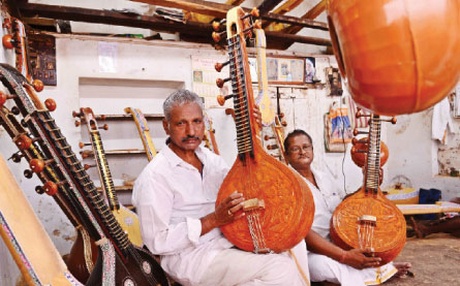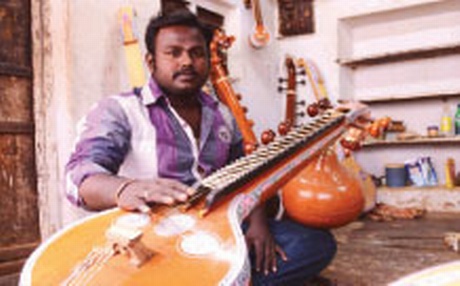
The ancient Thanjavur Veena has got a fresh lease of life. Recently, the veena was accorded the Geographical Indication (GI) status by a High Court. The status recognises the musical instrument as having special characteristics unique to the region and techniques employed by artisans who live in and around Thanjavur, a historic pocket of traditional music. In Thanjavur, the birthplace of the inimitable Saraswathi Veena (Thanjavur Veena), revered as one of the three celestial musical instruments which continues to enthral music lovers, makers of the musical instrument are rejoicing at this announcement.
The GI status provides better legal protection for action of infringement, offering a respite for the few families who are still devoted to this deeply satisfying but complex craft.
Just as Carnatic music is incomplete without this Vedic instrument, the veena-makers of yore enjoyed royal patronage and high respect in the community. With traditional instruments gradually falling out of favour, the living conditions and social standing of the veena craftsmen are, sadly, on the decline. The Thanjavur Veena, unique with its functional resonator and 24 fixed-frets enabling ragas to be played on it, is crafted by master craftsmen who possess immense knowledge of music and understand the nuances of sound and tonal quality. The very instrument exudes grace and elegance.
Having been a home-based cottage industry for generations, the art does not thrive on hereditary knowledge any more. “My two sons have taken up corporate jobs after MBA. I could not press them into veena making knowing the meagre income it would fetch,” says M Narayanan, a fourth-generation veena maker from Thanjavur.
Srinivasan, a state-award winning veena-maker’s son works for a software company. But, not everyone in the younger generation wants to part ways with the art of making the veena. Craftsman Raman’s son Krishnamoorthy returned after a short stint at a private company to help his father. “There was a compelling urge within me to continue making veenas,” says the 25-year-old who started Sri Sai Musicals. Besides crafting, he exports veenas to other countries and markets them online.
Procuring wood has become a challenge. Jackfruit wood is predominantly used for veena crafting as it’s perfect for all weathers. “Earlier, Thanjavur used to house large clusters of jackfruit trees. Nowadays we buy wood from places like Panruti and Cuddalore,” says Narayanan. They used to work with stag horns, which is now legally banned.

Srinivasan, who is familiar with modern crafting techniques aided by new tools and machines says that the motifs and symbols etched on the instrument have changed. “Earlier, it used to be figurines of Gods and motifs like the swan and peacock. Now it’s all modern designs and patterns,” he says.
Another pressing issue is the involvement of intricate workmanship and labour shortage. “We used to make the veena from scratch, including chopping the wood, carving, fixing the frets and waxing. These days, with only a few trained hands assisting us, we outsource parts from carpenters, and pay a large chunk to middlemen,” rues Narayanan. The Government-run ITIs offer training in veena craftsmanship, but there are no concessions or assistance to help artisans. The dearth of craftsmen may have a threatening impact on the quality, says a concerned Krishnamoorthy.
“Unfortunately, today’s focus is predominantly vocals; the instrument comes secondary. It’s also undergoing lots of structural changes. Anything that can be dismantled can’t be called a veena,” points out ‘Veenai’ E Gayathri, popular veena exponent and principal-director of the Tamil Nadu Government Music Colleges in Chennai, Thiruvaiyaru, Madurai and Coimbatore.
The Tamil Nadu Government has announced the setting up of a university exclusively for music. Efforts will be made to academise the craft of veena-making and providing a better platform to artisans. A good sign: the demand for the veena has not dwindled despite the popularity and influence of Western instruments. The veena’s sound has been preserved forever.
source: http://www.newindianexpress.com / The New Indian Express / Home> Magazine / by Sundari Sivasubbu / July 07th, 2013